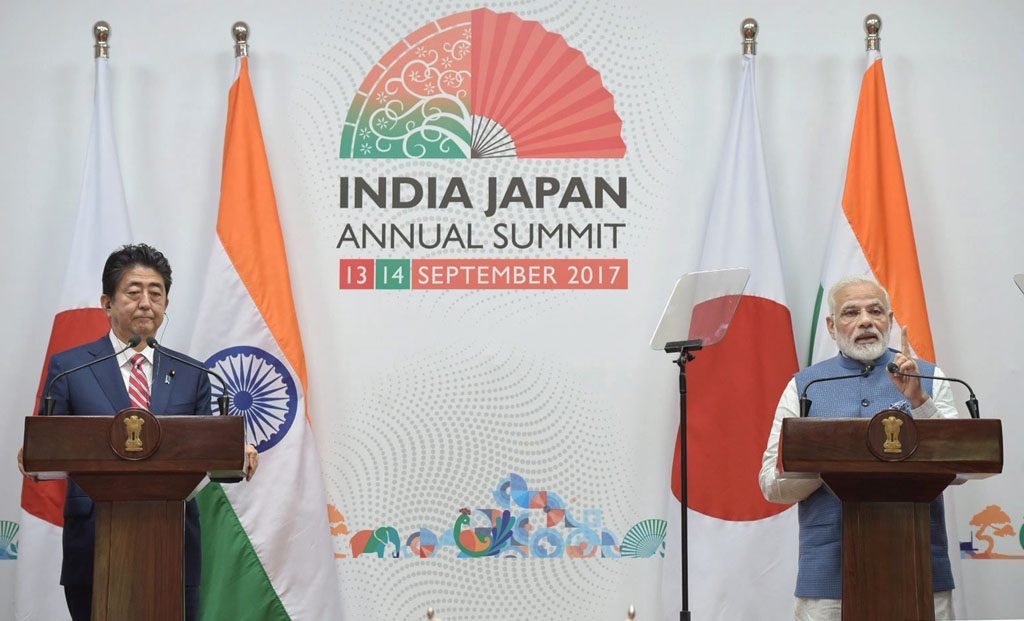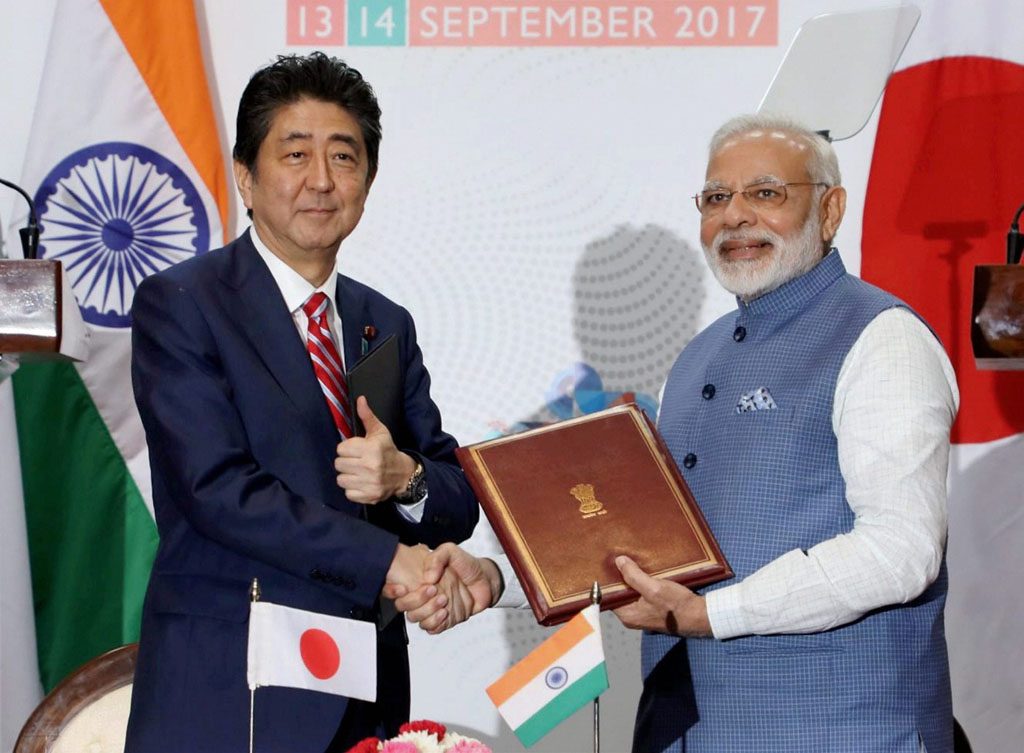
Ahmedabad, Sep. 14 (PTI): The countdown to India’s first bullet train from Ahmedabad to Mumbai began today with Prime Minister Narendra Modi and his Japanese counterpart Shinzo Abe launching the Rs 1.10 lakh crore project.
Modi described the ambitious project, which is expected to be completed by 2022 and will cut travel time between the two cities from seven hours to less than three, as a “big gift from Japan to India”.
Addressing crowds gathered at the Athletics Stadium in Sabarmati for the event, Abe said the Indo-Japan partnership was special, strategic and global.
“A strong India is in Japan’s interest and a strong Japan is in India’s interest,” Abe said after the two leaders pressed a button, unveiling a plaque.
“My good friend Prime Minister Narendra Modi is a farsighted leader. He took a decision two years ago to bring a high-speed train in India and to create a new India,” he said.
The Japanese prime minister added that he hoped to enjoy the “beautiful scenery of India through the windows of the bullet train” when he returns in a few years.
He said the launch of the bullet train by Japan’s Shinkansen Technology, which will also provide technology for India’s project, had changed the country’s economy, society and people’s lives.
Congratulating the people of India, Modi said this was a “a bold step towards realising an old dream of a bullet train”.
Lauding Japan, he said the country was such a friend that it gave a loan of Rs 88,000 crore at 0.1 per cent interest for the project.
Modi also took a dig at the opposition which had often sounded sceptical about the bullet train project.
“When earlier I talked about bullet train, they (opposition) used to say it was big talk, and now when it has come they are saying what is the need for it,” Modi said.
“Our stress is now on high-speed connectivity which will improve speed, reduce distance and ensure economic progress,” he added.
In 1964, Modi said, Japan started the bullet train and now this technology was in 15 countries.
“From Europe to China, the bullet train s image can be seen everywhere. Not just economical but also societal changes have been brought about by these trains, said Modi.
The government wants to start the Ahmedabad-Mumbai High Speed Rail Network on August 15, 2022 to mark India s 75th year of Independence.
The train would cover the distance of over 500 km between the two cities in less than three hours.
Japan has extended a soft loan for the ambitious project conceptualised by Modi. The project is a joint venture between Indian Railways and Japan’s Shinkansen Technology.
The prime ministers of the two countries also laid the foundation stone for an institute that will come up at Vadodara where around 4,000 people will be trained for the bullet train project.
Railway Minister Piyush Goyal, Gujarat Chief Minister Vijay Rupani and his Maharashtra counterpart Devendra Fadnavis were present on the occasion.
While Abe, who arrived here yesterday on a two-day visit, spoke in Japanese, Modi spoke in Hindi. Abe’s speech was translated into Hindi.
According to Achal Khare, CMD, National High Speed Railway Corporation, bullet train fares would be 1.2 per cent more than the basic fare of AC first class.
“If, for example, the air fare in this route is Rs 4,000, then the bullet train is expected to be Rs 3000. We will try to keep it competitive,” he added.
India, Japan agree to strengthen cooperation against Pakistan-based terror groups
Gandhinagar: Strongly pitching for a “zero- tolerance” approach towards terrorism, India and Japan today agreed to strengthen cooperation against terror groups like Al-Qaida and Pakistan-based Jaish-e-Mohammed (JeM) and Lashkar-e-Taiba (LeT).
Prime Minister Narendra Modi and his Japanese counterpart Shinzo Abe asked Islamabad to bring to book the perpetrators of terror strikes, including those involved in the Mumbai (2008) and Pathankot (2016) attacks, according to a joint statement issued after their annual summit.
The two leaders also condemned in the “strongest terms” the growing menace of terrorism and violent extremism, it said.
“They shared the view that terrorism in all its forms and manifestations is a global scourge that must be forcefully combated through concerted global action in the spirit of ‘zero tolerance’,” the document said.
The two prime ministers called upon all countries to work towards rooting out terrorist safe havens and infrastructure, disrupting terrorist networks and financing channels and halting cross-border movement of terrorists, in an apparent reference to Pakistan.
“They looked forward to the convening of the fifth Japan-India Consultation on Terrorism and to strengthening cooperation against terrorist threats from groups, including Al-Qaida, ISIS, JeM, LeT and their affiliates,” the statement added.
Modi and Abe called upon all UN member countries to implement UNSC resolution 1267 and other relevant resolutions dealing with the designation of terrorist entities, the statement said.
India, Japan sign 15 agreements

Gandhinagar, Sep. 14 (IANS): India and Japan on Thursday signed 15 agreements, including one to give a fillip to India’s Act East policy by enhancing connectivity and developmental projects in India’s northeast, and for more flights between the two countries.
The agreements were inked after the annual bilateral summit between Prime Minister Narendra Modi and his Japanese counterpart Shinzo Abe here.
An agreement was signed between the Union Home Ministry and the Japanese government for cooperation and collaboration in the field of disaster risk management and to share experiences, knowledge and policies on disaster prevention.
In the field of skills development, an agreement was signed to strengthen bilateral relations and cooperation in the field of Japanese language education in India.
An agreement was signed for an India Japan Act East Forum to enhance connectivity and promote developmental projects in the northeastern region of India in an efficient and effective manner.
Another agreement was signed between the Department of Industrial Policy and Promotion and Japan’s Ministry of Economy, Trade and Industry to accelerate and facilitate Japanese investments in India.
India Post and Japan Post inked an agreement to implement the commercial arrangement of “Cool EMS” service through which fresh food can be sent from Japan to India in cool boxes for Japanese expatriates in India.
An agreement was signed on cooperation in infrastructure development programmes in the Mandal Bechraj-Khoraj region of Gujarat.
Another agreement envisages Indian and Japanese carriers mounting unlimited number of flights to the selected cities of each other’s countries.
To promote institutional cooperation between India’s Research and Information System (RIS) think tank and Japan’s Institute of Developing Economies (IDE-JETRO) and a memorandum of understanding (MoU) was signed to strengthen the capacity of research and effectiveness of dissemination of research findings.
Three agreements, including an MoU was signed on cooperation in the area of science and technology.
Two more MoUs and two letters of intent were also signed in the area of sports cooperation.
Earlier in the day, Modi and Abe participated in the ground-breaking ceremony for the Ahmedabad-Mumbai high speed rail project in Ahmedabad. Abe arrived here on Wednesday on a two-day visit.

